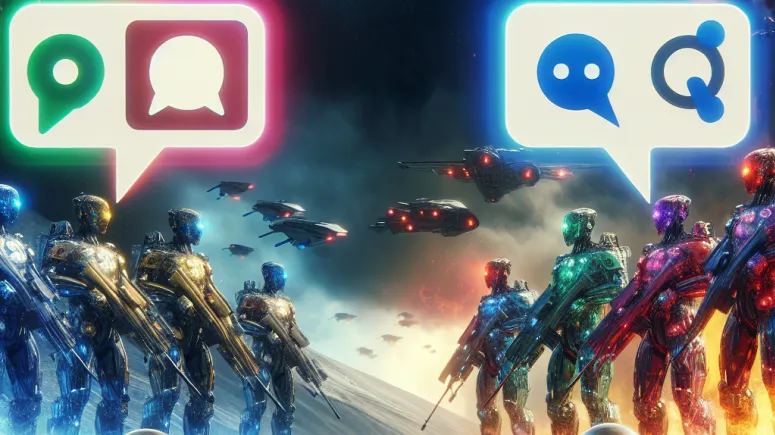The debate among AI (artificial intelligence) enthusiasts has been sparked by the two sides, ChatGPT and Google Troubadour. Both platforms provide next-level natural language processing powers. But when we compare them, we uncover some interesting points and a sort of rivalry that leads us to ask: which one is better? To find out, let’s look into the resources, drawbacks, and unique features of both of these next-gen AI platforms. Eventually, we might get closer to an answer and see which model—ChatGPT or Google Troubadour—could be the better fit for you.
Table of Contents
Unraveling the Clash: ChatGPT vs Google Bard
The global tech community has been captivated by the ChatGPT and Google Bard AI platforms, which are locked in a charismatic rivalry. These platforms have unmatched natural language processing skills that experts believe are on the cusp of human intelligence. But how do these two platforms compare with each other in quality, performance, and advanced NLP tricks that make them superhuman? Let’s read between the lines to unveil the differences that matter.
Key Points of Comparison:
- Accuracy: ChatGPT is particularly good at creating responses that are very like what a human would say when a certain input is given. Comparatively, Google Bard is most well known for creating content that is good and natural-sounding—quality, it is supposed to be close to what humans can produce and very contextually relevant.
- Scalability: Google Bard demonstrates outstanding scalability in generating huge amounts of content while maintaining high efficiency. Meanwhile, ChatGPT is more adaptable than previous versions across different writing tasks.
- Language Understanding: ChatGPT exhibits a profound comprehension of subtleties in language deployment. Google Bard, in contrast, accentuates the formation of appealing and interactive conversations.
When we navigate the intricate world of AI, we uncover two models that yield great advantages by using AI to address the diverse requirements of our clients. Accuracy and consistent adaptability are the clear winners in the man-made intelligence realm. And yet, these two stages present special qualities that fulfill new and different promises made there. Let’s look closer at them.
Features and Capabilities of ChatGPT
Examining what sets ChatGPT apart in the world of AI reveals its distinct features and capabilities. This software is well known for its strong text creation, and many users swear by it because of the wide range of functions it offers. It is not that it can generate excellent text. It is also how it can be bent to suit a particular expectation or command. For certain tasks, it is the best in the AI world, and that is what makes it famous. Let us peer into the substance of what makes ChatGPT the superior product it is portrayed to be.
Key Features of ChatGPT:
- Advanced Language Processing: ChatGPT showcases advanced language processing capabilities, enabling it to understand and generate text with remarkable accuracy.
- Contextual Understanding: The platform excels in grasping contextual nuances, allowing it to produce responses that mirror human-like interactions.
- Flexible Integration: ChatGPT offers seamless integration options, making it easy to incorporate into various applications and workflows.
When we dissect the components and capabilities of ChatGPT, it becomes clear that this is a very adaptable tool that can handle a wide range of use cases for generating text. If you need a nuanced, or perhaps even an artsy, kind of reply to a prompt, then GPT hardly falls short. It can also handle situations where the context of what you might say next has significant importance. And it does a good (if not sometimes “too good”) job of being consistent over long stretches of interaction.
Exploring the Strengths of Google Bard
If we take a closer look at the assets of Google Bard, we’ll see a realm of virtual creativity and skills that put it in a class by itself amongst today’s leading AI. What we now have is an engine that’s ideal for those who have a preference for text and text-driven subjects. Despite being a recent entry, it projects benchmark potential in this space and is, without question, capable of great things. Buckle up as we explore the exceptional strength that makes this virtual cog in Google’s machinery formidable.
Key Strengths of Google Bard:
- Deep Learning Capabilities: Google Bard leverages deep learning techniques to enhance its text generation abilities, resulting in content that is not only accurate but also contextually rich.
- Interactive Dialogue Creation: The platform excels in creating interactive and engaging dialogues, making it ideal for applications requiring dynamic conversational interactions.
- Multi-Language Support: Google Bard boasts robust support for many languages, catering to a diverse range of users across the globe.
As we dissect the qualities and abilities of Google Minstrel, it’s evident that the platform is designed to serve the complex demands of working with digital text at scale. … Google Minstrel understands language with a level of subtlety and nuance that belies its Transformer core. It is also “bilingual at birth,” which means it is just as likely to generate high-quality Dutch or German translations as it is to generate English ones.
User Experience Comparison: ChatGPT vs Google Bard
To compare the user experience of ChatGPT and Google Bard, we must examine how these AI platforms serve the needs and fulfill the desires of their users. Usability and effectiveness are the two most critical ingredients. The comparison must take into account the various application contexts in which these tools are used. Although effectiveness and scenarios of use are difficult to capture in a metric, the comparison should focus on these two aspects of the user experience.
User Experience with ChatGPT:
- Intuitive Interface: ChatGPT offers a user-friendly interface that allows users to interact seamlessly with the platform, making it easy to generate text effortlessly.
- Personalization Options: The platform provides users with the ability to customize settings and preferences, enhancing the user experience and catering to individual needs.
- Prompt Response: ChatGPT delivers quick and accurate responses, ensuring a smooth and efficient user interaction process.
As we go through the client experience sections of ChatGPT and Google Poet, it’s evident that each stage presents its special brand of real value. ChatGPT, we notice, excels in effortless interface and fast, short bursts of conversation. It makes all components work together in a way that invites users to play and effortlessly draw unexpected but delightfully human-like responses from the AI “friend” with whom they’re chatting.
Making the Choice: Which is Better, ChatGPT or Google Bard?
When confronted with the choice between ChatGPT and Google Bard, it can be difficult to determine which one is superior. Both AI models have their merits, and indeed, each has its own unique selling points, which makes the choice all the more difficult. Let’s consider the possibilities and look at some of the most important factors that can help you make an intelligent decision about which you can be confident is the right platform for you.
Considerations for Choosing between ChatGPT and Google Bard:
- Use Case: Evaluate your specific use case and requirements to determine which platform aligns better with your objectives.
- Technical Expertise: Consider your familiarity with AI technology and choose a platform that matches your level of technical expertise.
- Scalability Needs: Assess the scalability requirements of your project and select a platform that can accommodate your growth potential.
While we investigate the energetic interaction between ChatGPT and Google Singer, it is necessary to recognize that the two platforms confer distinct advantages, depending on the unique needs of the user. When it comes to certain areas like natural language processing and accurate response formulation, ChatGPT has the upper hand. , for conversational agents with the ability to babble in a multitude of languages, Google Singer shines.






